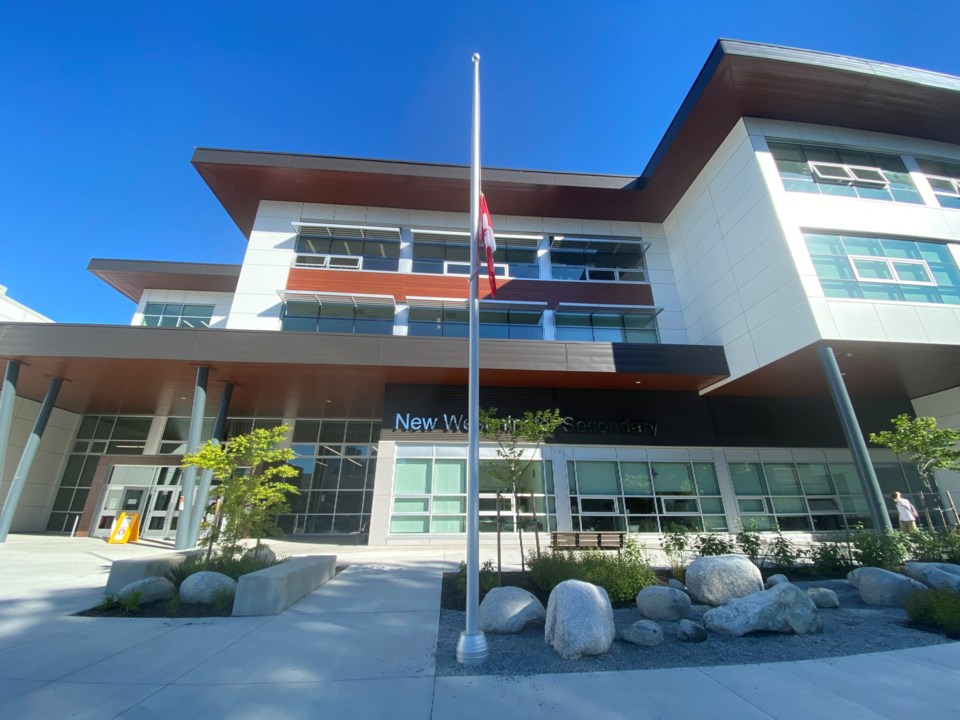The New Westminster school district is committed to putting reconciliation into action in the coming school year and beyond.
That message was delivered at the school board’s education committee June 8.
Trustee Maya Russell, who chairs the committee, took time to acknowledge the impact of the discovery of the graves of 215 children on the grounds of the former Kamloops Indian Residential School and the intergenerational trauma caused to Indigenous people by the residential school and day school experience.
“We know that words of acknowledgement are not enough to do justice to Indigenous students and their families in our district. We also need to change our structures, policies and practices,” she said.
“I hope that this board has shown our willingness to do that work: to stop causing harm, to affirm Indigenous rights and territory, and to facilitate access to culture and language which was interrupted by the state for seven generations.”
The board agreed to adopt Orange Shirt Week in New Westminster schools this fall, from Sept. 27 to Oct. 1. Associate superintendent Maryam Naser said more information will come to the board in the fall about related work in the district, including learning for students, professional development for staff and new initiatives such as an elder-in-residence program.
The district has also committed to consulting with members of its Aboriginal education team as a stakeholder group during its budget process next year, secretary-treasurer Bettina Ketcham noted.
Those moves come on the heels of the district’s decision to rename Richard McBride Elementary School as Skwo:wech Elementary, after the Halq’eméylem word for sturgeon.
Last year, the district also agreed to embark on the creation of an anti-racism framework and strategy, and those efforts are continuing.
ROOTS OF RECONCILIATION
Reconciliation work is not new to the New Westminster school district.
Qayqayt First Nation Chief Rhonda Larrabee, speaking at the May 25 school board meeting when the Skwo:wech name was revealed, noted her longstanding relationship with the district.
“School District 40 has been welcoming, respecting, honouring our culture for many, many years, since the ’90s, and you have no idea how much I appreciate it. As far as I’m concerned, your reconciliation process started a long time ago, before it was mandated and necessary,” she said.
Larrabee said it started with her being asked to join the district’s Aboriginal advisory committee. Since then, she has worked with staff and First Nations workers at district schools and been a part of numerous initiatives and events.
“I have had nothing but pleasure from visiting all the schools, meeting all the staff, all the teachers, talking to the kids – that’s the best,” she said. “It’s wonderful that we’re able to bridge the young children so that we can stop this stem of racism throughout our community. I think it’s working.”
Larrabee said the naming of the district’s newest school, École Qayqayt Elementary, in 2013, really helped to “get the ball rolling” for reconciliation work.
In 2019, the New Westminster school board endorsed a five-year Aboriginal Education Enhancement Agreement (2018 to 2023) and committed to implementing recommendations outlined by Canada’s Truth and Reconciliation Commission.
*
IF YOU NEED HELP
Reconciliation Canada offers a list of places to turn for those residential school survivors and others for whom the recent news of graves found at multiple residential school sites in Canada has caused trauma. Among them:
KUU-US Crisis Line Society
The KUU-US Crisis Line Society is a 24-hour provincial Aboriginal crisis line.
Phone: Adult Crisis Line 250-723-4050
Youth Crisis Line: 250-723-2040
Indian Residential School Survivors Society (IRSSS)
The Indian Residential School Survivors Society has a 24-hour crisis line.
Phone: 1-866-925-4419
Follow Julie MacLellan on Twitter @juliemaclellan.
Email Julie, [email protected].



